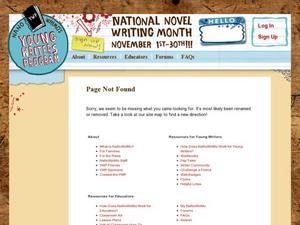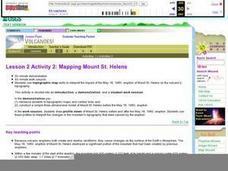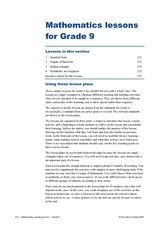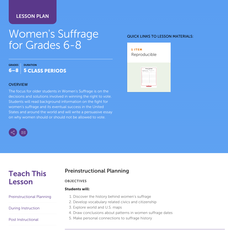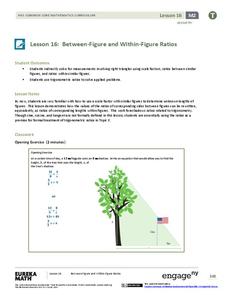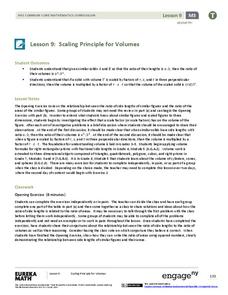Curated OER
Lesson Plan 4: Creating Main Characters
Creating a good main character is a must when writing a creative narrative or novel. Elementary aged writers create main characters for the novel they are writing. They first use themselves as a models, then create a character as a...
Curated OER
Lesson Plan 5: Creating a Supporting Character
As a class, young writers learn how to develop a strong supporting character. They think and discuss a good friend they know, they use that friend as a basis for a potential supporting character. They create a supporting character as a...
Missouri Department of Elementary
Happy, Sad, Scared and Mad: All Belong To Me
"What are feelings?" and "Why are feelings important to understand?" are the essential questions of a lesson plan that boosts self-awareness. Scholars discuss the four basic emotions—happy, sad, scared, and mad—in...
Missouri Department of Elementary
Feeling Faces
A activity help scholars identify emotions through facial expressions. After a friendly puppet reads scholars a poem all about feelings, learners act out how they would feel when a specific action happens to them. Participants watch and...
Curated OER
Lesson 2 Activity 2: Mapping Mount St. Helens
Students use topographic map skills to interpret impact of the May 18, 1980 eruption of Mount St. Helens on the volcano's topography, and draw profile views of Mount St. Helens before and after the May 18, 1980, eruption.
Curated OER
Lesson Skill: Determining Audience and Purpose
“. . . the car looked as it had caught some terrible disease.” Pairs read and then illustrate a passage from either “The Year I Drove through the Car Wash” or “Riding Is an Exercise of the Mind” in preparation for a discussion of...
Curated OER
Where are Koalas on the Food Chain?
Take a field trip to observe Koalas, absolutely! Budding scientists become familiar with the Koala's position in the food chain. They answer questions based on what they see and draw a food chain explaining the Koalas position. Tip: A...
Curated OER
Mathematics Lesson for Grade 10
There are four main topics in this bundle of lesson plans. They don't need to be taught sequentially. Each lesson has three parts: a starter, a main activity, and something to help consolidate and provide reflection on concepts learned.
National Endowment for the Humanities
Ending the War, 1783
The various peace proposals, made by both sides, to end the Revolutionary War come under scrutiny in this final lesson of a three-part series on the war. Class members read primary source documents and compare them with military...
Education Institute
Four Mathematics Lessons for Grade 9
These four lesson plans build algebra skills for working with numbers in exponential form and for examining triangles. Be aware that in the text, scientific notation is referred to as index notation and the laws of exponents as the laws...
EngageNY
The Mean as a Balance Point
It's a balancing act! Pupils balance pennies on a ruler to create a physical representation of a dot plot. The scholars then find the distances of the data points from the balance point, the mean.
Curated OER
A Seashell Lesson: Writing for Detail and the Scientific Process
Practice descriptive language in this lesson, which prompts elementary and middle schoolers to write detailed descriptive sentences describing a seashell. They write a description of a shell, create an illustration, and other students...
Curated OER
Solar Kit Lesson #13 - Solarize a Toy
Physical science or technology classes will be invigorated by this challenge: to convert a toy, game, or other device to run on solar power. In doing so, they will design the appropriate solar arrays. This is an A+ activity,...
Scholastic
Women's Suffrage for Grades 6–8
Learners study the decisions and solutions involved in winning the right to vote. After reading background information on the fight for women's suffrage, including one woman's story, and its eventual success in the United States and...
J. Paul Getty Trust
Shaping Ideas: Symbolism in Sculpture—Lesson 3
The final session in a sequential, three-lesson plan sculpture study designed by the education staff of the J. Paul Getty Museum in Los Angeles has class members using the criterial they developed to critique each others' symbolic...
Curated OER
Archeology Lesson; Making Inferences
Students discover what an archeologist is and make inferences about societies and cultures based on artifacts. In this archeology lesson, students complete an array of captivating activities, guessing about what an artifact is...
Curated OER
The Tiny Seed Lesson Plan Guide
Not only is this lesson about story retell, main events, and making predictions, it's also about plants. Youngsters will read the tale, The Tiny Seed as they explore the plant life cycle and early literacy skills. The lesson is very...
Maine Content Literacy Project
Introduction to Short Story Writers Say
There are so many authors of short stories, and your class can have the chance to study quite a few. This seventh lesson plan in a series of fourteen continues the decision-making process for the final assessment: a short story author...
ESL Kid Stuff
Our World
There's a beautiful world all around us! Learn about the features of our planet with a series of activities designed for English learners. Kids sing, dance, and read about nature with fun lessons and interactive play.
EngageNY
Between-Figure and Within-Figure Ratios
Tie the unit together and see concepts click in your young mathematicians' minds. Scholars apply the properties of similar triangles to find heights of objects. They concentrate on the proportions built with known measures and solve to...
EngageNY
Scaling Principle for Volumes
Review the principles of scaling areas and draws a comparison to scaling volumes with a third dimensional measurement. The exercises continue with what happens to the volume if the dimensions are not multiplied by the same...
NOAA
Tracking a Drifter
Be shore to use this drifter resource. The third installment of a five-part series has learners using the NOAA's Adopt-a-Drifter website to track to movement of a drifter (buoy) in the ocean. Graphing the collected data on a map allows...
Teach Engineering
Solar Angles and Tracking Systems
The sun will continue to rise in the east and set in the west, no matter what. The first lesson plan in a series of eight introduces the class to solar angles. It makes connections between a person's latitude and the angle of position of...
EngageNY
Informal Proofs of Properties of Dilations
Challenge the class to prove that the dilation properties always hold. The lesson develops an informal proof of the properties of dilations through a discussion. Two of the proofs are verified with each class member performing the...

